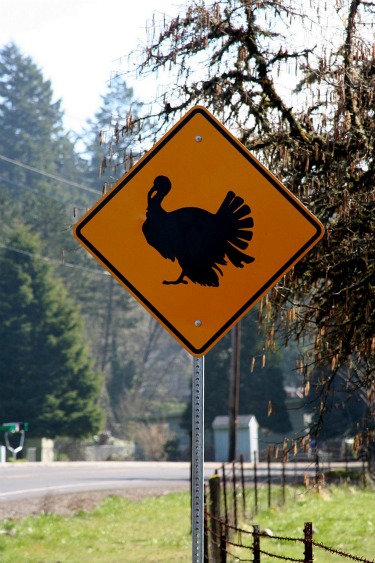Gobble, Gobble, Gobbledygook: Truths About Turkey
By John DiGilio in Food on Nov 23, 2011 5:20PM
With Thanksgiving just a day away, most Americans are already dreaming about drumsticks. Sure, we've heard about other traditions cropping up and, of course, there are our vegetarian and vegan friends. However, when it comes to this holiday, the traditional bird is still the big draw. Baked, broiled, roasted, and dare we even say fried, the turkey is the undisputed king of the Thanksgiving table. They don't call it “Turkey Day” for nothing!
In preparation for the big day ahead, we thought we get you in the great gobbler spirit by sharing some of the facts and fallacies about old Tom. Some of these you have probably heard before. Some may even surprise you. Before you grab that gizzard, take a moment, peruse our list, and offer up a little thanks for the millions of birds that make it all possible.
Let's talk turkey:
The First Thanksgiving: If you are like most Americans, you undoubtedly grew up believing that turkey has been a Thanksgiving tradition since the very first such celebration in the New World. That is not to say that the Pilgrims did not dine on drumsticks during the first Thanksgiving. There is just no evidence that they belonged to turkeys. Historical records are quite clear on the fact that venison was served. Five deer were provided by the Wampanoag Indians who joined in the feast. All that was recorded of the English contribution to the meal, however, was that it consisted of “wild fowl”. Could this have included turkey? Sure. If it helps your digestion tomorrow, you should go right on believing it did!
Turkey Coma: One of the most prevalent myths about turkey concerns its supposed ability to put you to sleep faster than an Truffaut flick. The story goes that turkey contains a naturally occurring chemical called tryptophan which makes you sleepy... hence the after-dinner nap that has become almost as traditional as the meal itself. Here again, there is at least some truth to inspire the conjecture. Turkey does indeed contain tryptophan. In fact, most meat does. It is an amino acid that aids in the production of serotonin, which in turn helps regulate relaxation and sleep. The problem is that you could mack on that bird all day (and some of you do) and never get enough tryptophan to make you fall asleep. The post-Turkey coma that so many of us experience on Thanksgiving has a lot more to do with the excitement of the meal, the act of stuffing ourselves silly, and the amount of energy our bodies have to expend to digest it all. Oh, and let's not forget the copious amounts of alcohol we use to wash it all down!
Heart Health: Another often cited bit of turkey lore that is actually true has to do with how good it is for you in comparison to other meats. Turkey is a very lean meat. To keep it that way, be sure to remove the skin prior to eating it. It is positively packed with protein, having more per ounce than beef. Just one serving will supply your body with nearly half its daily protein requirement. Nutritionally speaking, turkey is an excellent source of iron, niacin, and those all-important B vitamins. Additionally, it is low in calories and contains trace amounts of the immunity-boosting mineral selenium. Yes, Virginia, turkey has been named a “superfood” and that is something for which we can all be thankful.
Consumption Junction: The National Turkey Federation estimates that 46 million turkeys were served up in American homes last Thanksgiving. That translates to almost 740 million pounds of bird meat in just one day! The United States is the number one consumer of turkey in the world (16.4 lbs per person in 2010) at almost twice the rate of its nearest competitor, second place Canada. Minnesota produces more turkeys for the table than any other state in the U.S. (47 million birds last year alone!). Chew on that!
What is going to be on your table this Thanksgiving? We are obviously betting on the bird. Some traditions are simply too hard and too tasty to break. Myths and speculation aside, there are many good reasons to put a little turkey on your menu this holiday season. It is certainly versatile enough and it's good for you. So eat up and join us in raising a drumstick to another year and another safe and happy holiday. If you're not too full tomorrow and feel up to it, post your favorite recipes for leftover turkey. A lot of us are going to be eating it for days to come!
